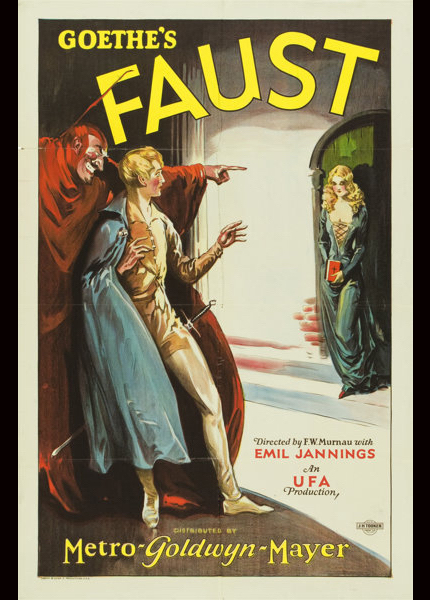Evaluating FAUST, F.W. Murnau's Classic

Silent film director F.W. Murnau is probably best known for his work on the classic macabre film Nosferatu. Just to be clear, that may be his best film, as I almost assumed that he directed Metropolis in 1927. That was Fritz Lang. Anyway, there is another film that pops up in Murnau's filmography, Faust. [Editor's note: our own James Marsh considered the film in an excellent article, Learning From the Masters of Cinema, back in 2014.]
The 1926 silent film centered around an elderly alchemist named Faust, who comes in contact with the evil Mephisto, who makes him a bargain to give the alchemist his youth. Once granted his youth, he falls in love with a woman named Gretchen and the two make love. However, Faust and Gretchen's brother Valentin duel, only for Mephisto to intervene and kill Valentin. Mephisto and Faust flee, while Gretchen is ousted as a harlot and is publicly shamed for her sexual intentions.
Afterwards, she has Faust's child, but the baby dies in the snow after Gretchen has become an outcast and she is condemned to death for endangering and "killing" her baby. Faust arrives with the help of the Devil and attempts to save her, but Satan takes away his youth at the last minute and the two perish in the fires.
Religious Undertones
If we are looking at the movie at face value, the film has a plethora of religious references and clues that add to its obvious German Expressionism. Satan makes a deal with an Archangel that he could break the divinity of a man, and if he won, Satan would exert dominion over the world.
In the end, Satan failed, the angels prevailed and cast him asunder. Of course, we all should have seen how this was going to play out for the Devil because it never usually goes his way in the media.
The religious undertones are a way to represent Faust and his shifting morality throughout the film. He begins as a humble alchemist who did not seem tempted or swayed by Satan's powers. However, as he became more under the influence of Lucifer, his morals dollied to the other spectrum and he became more brash and careless in his motives, which shows how dark and sinister the Devil's motives can be.
'The Power of Love' Cliche
Since the end of the film shows how love triumphs over all things evil, it can be said that this silent film is one of the first movies to start that overlong cliche. This has been discussed for so many years -- that love prevails over everything -- and it would be endearing if every romantic movie didn't have the exact same ending and premise to the point of predictability.
It is still strong and resonant in the realm of the movie, but this is not the first love story that I have seen and the gag seems over-played.
Final Conclusion: Is it any good for today's audience?
Yes, it is still good. Despite some cliches, this film proves to be a highlight in Murnau's filmography and serves as a delightful silent film crawling with religious text and a beautiful landscape that any filmmaker will appreciate.
Faust (1926) is available to stream on Arrow and other platforms. It is also available for rent or to buy via Apple TV+ and Kino Now.
Poster: By Metro-Goldwyn-Mayer, UFA - Source, Public Domain, .







